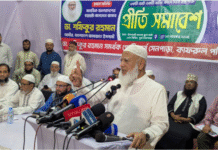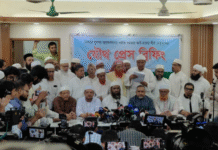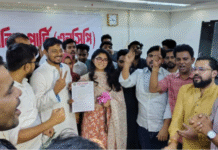
Civil society members attend a pre-general election dialogue hosted by Election Commission at a conference room at EC headquarters in Dhaka on Monday. — Ali Hussain Mintu
At least 40 civil society personalities on Monday advised the Election Commission to restore the provision of army deployment and provide ‘no vote’ option to the electorate by amending the Representation of Peoples Order for the next parliamentary elections.
Emerging from a pre election dialogue hosted by the EC, they told reporters that they also advised the EC to earn people’s trust for holding credible election, acceptable to all.
Officials said that the EC began the dialogue under its action plan for the next general election which must be held between October 31, 2018 and January 28, 2019.
The civil society participants included right activists, former bureaucrats, former diplomats, university teachers and development activists.
Centre for Policy Dialogue’s Debapriya Bhattacharya said that he advised the EC to take the initiative for a new legislation ensure transparent expenditures during election campaigns and curbing ‘nomination trading’.
He said that the EC was facing the challenge of proving its independence.
He said that the EC also must ensure that the administration remains neutral during elections.
He said that chief election commissioner KM Nurul Huda drew severe criticism from most of the civil society participants for stating recently that there was no scope for the EC to create level playing field before announcing the election schedule.
Sharply disagreeing on this point, the civil society people categorically advised the EC to proceed for the creation of the level playing field right from now.
Former caretaker government adviser M Hafizuddin Khan said that the EC was advised to amend electoral laws to create equal opportunities for all the parties.
Dhaka University professor Tasneem Arefa Siddiqui said that she suggested for the creation of opportunities for the voters living abroad to cast their votes.
She also said that the participants told the EC in categorical terms that none wanted to see another election lacking legitimacy like the election held on January 5, 2014 .
DU professor Asif Nazrul said that he called for the removal of fear of contestants and their polling agents.
He said that army deployment in the next election was a common demand.
Dilara Chowdhury, who taught political science at different universities, advised the EC to deploy army to avoid violence in the next election.
Academician Salimullah Khan called for curbing ‘financial terrorism’ in the run up to the elections, on the polling day and after the polls.
The best way for the EC to prevent ‘financial terrorism’, he said, would be to bear the election expenses of all the candidates.
Bangladesh Adivasi Forum General Secretary Sanjib Drang called for putting in place ‘special security’ in areas inhabited by ethnic and religious minority people during the elections.
Local government expert Tofail Ahmed requested the EC not to consider elections as a mere technical matter but as a political issue.
History professor Syed Anwar Husain demanded disqualifying anyone whose names appeared in the Panama Papers from contesting elections.
The three and a half-hour dialogue with a 30-minute break for lunch ended at 3.30PM when the CEC told a news briefing that the EC would expect the ruling alliance and the opposition political parties, including those not in Parliament now, would be able to reach a consensus about the next general election.
He said that by December the EC would publish a report containing the suggestions made by the civil society personalities at Monday’s dialogue.
Among others, professors Ajoy Roy, Tareque Shamsur Rahman and MM Akash, rights activist Khushi Kabir, former Bangladesh bank governor Mohammed Farashuddin and Begum Rokeya University vice chancellor Nazmul Ahsan Kalimullah, former caretaker government advisers Hossain Zillur Rahman and Rasheda K Choudhury, former cabinet secretary Ali Imam Majumder and TIB executive director Iftekharuzzaman.
Source: New Age









